Caring for a loved one often requires navigating complex and evolving needs. Suppose you’ve been seeking additional support caring for your older parents. In that case, you’ve likely come across the terms “Activities of Daily Living (ADLs)” and “Instrumental Activities of Daily Living (IADLs)”–both of which are utilized by senior living communities to help figure out what kind of assistance an individual needs.
IADLs describe tasks and activities that require more complex thinking skills, such as meal preparation, banking, managing medications, or employment. ADLs, on the other hand, encompass basic daily tasks and activities, such as getting dressed, eating, and grooming. Both are important for assessing and supporting a loved one’s independence.
What Are Instrumental Activities of Daily Living?
IADLs refer to the more advanced tasks individuals perform to live independently and manage their daily lives. These are often more complex than essential functions and require cognitive, organizational, and physical abilities.
Some common examples of IADLs include:
- Cooking and meal preparation
- Managing finances
- Grocery shopping or other errands
- Housekeeping and home maintenance
- Managing medications
- Using communication tools such as the phone or email
- Traveling and navigation
While these tasks may seem routine, they are critical in maintaining a person’s autonomy. Challenges with IADLs are often a sign that someone may need additional support.
How Are IADLs Different From ADLs?
To fully understand IADLs, it’s necessary to differentiate them from Activities of Daily Living (ADLs).
ADLs are fundamental self-care tasks that include:
- Bathing
- Dressing
- Eating
- Toileting
- Transferring (e.g., moving from bed to chair)
These functions are fundamental for personal well-being. On the other hand, IADLs are more complex activities that are necessary for living independently in a community. They require higher-level cognitive and physical functions, like decision-making and fine motor skills.
For example:
- Eating (ADL) involves feeding oneself.
- Meal preparation (IADL) involves more detailed steps and coordination. It consists of planning, cooking, and serving the meal.
Think of it this way: ADLs are about surviving, while IADLs are about thriving independently.
How Instrumental Activities of Daily Living Work
IADLs require a combination of cognitive, physical, and emotional functioning:
- Cognitive skills are needed for tasks like managing medications or paying bills. These involve planning, problem-solving, and decision-making abilities.
- Physical abilities are used for tasks like grocery shopping or home maintenance. They require mobility, agility, and coordination.
- Social connection, such as communication, often plays a role in IADLs. Staying connected via phone or email fulfills practical needs and enhances emotional well-being.
Age, health conditions, or environmental challenges can influence one’s ability to perform IADLs. Recognizing how these factors interact can help optimize support strategies.
Why Are IADLs Important?
IADLs serve as markers of functional independence. They often indicate how well someone can manage life on their own or if they might require assistance. Monitoring IADLs can help family caregivers spot early signs of cognitive decline, mobility limitations, or other health concerns.
For example, difficulty managing finances may point to memory issues or declining problem-solving abilities and challenges with transportation signal reduced mobility or vision problems.
Additionally, assessing IADLs is essential for developing personalized care plans. Understanding where a loved one struggles allows you to determine the level of support needed, whether it’s help from family members or professional caregivers.
How to Manage Difficulties with ADLs & IADLs
What happens when a loved one begins struggling with IADLs? While the first instinct is often to “take over,” empowering them to maintain independence wherever possible is vital. Here’s how to approach difficulties effectively:
- Assess needs: Begin by thoroughly evaluating your loved one’s abilities. Identify which IADLs they can manage independently and where help is needed.
- Communicate: Discuss difficulties openly with your loved one and involve them in creating solutions.
- Monitor changes over time: Functional abilities can change. Regular check-ins ensure you catch emerging challenges early.
- Leverage technology: Tools like medication management apps or grocery delivery services can make many IADLs more manageable.
- Seek professional support: Occupational therapists or geriatric care managers can offer tailored interventions to improve functional abilities.

By balancing providing support and preserving autonomy, you can enhance their quality of life and dignity.
Improving Abilities Related to Instrumental Activities of Daily Living
Enhancing IADL abilities is possible with focused strategies. Here are some ideas to promote independence and build confidence in these tasks:
- Make the environment more user-friendly: Declutter spaces, ensure good lighting, and make available tools like grab bars or ergonomic kitchen utensils.
- Encourage cognitive exercises: Brain-training apps, puzzles, or activities like reading can help improve mental abilities essential for IADLs.
- Engage in physical activity: Strengthening exercises or gentle yoga can improve mobility and coordination.
- Set up routines: Establishing regular schedules for tasks like grocery shopping or paying bills can make these activities less overwhelming.
- Provide training: Help your loved one learn new skills, such as how to use a smartphone or app for communication or reminders.
Remember, it’s not about doing everything for your loved one but offering them the tools and support to succeed.
Empower Your Loved One Through IADL Support
Understanding Instrumental Activities of Daily Living is an essential part of caregiving. These tasks indicate independence and offer insight into your loved one’s well-being. By assessing IADLs thoughtfully and implementing strategies to improve their abilities, family caregivers can empower their loved ones to live more fulfilling lives. All American Assisted Living knows that whether it’s through minor adjustments or professional support, every step you take can significantly impact your loved one’s life. Contact us today to learn how our Assisted Living communities could help make your loved one’s everyday living easier.





